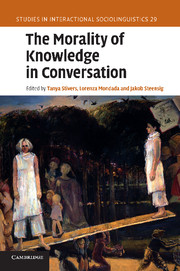Book contents
- Frontmatter
- Contents
- Contributors
- Preface
- Acknowledgements
- List of transcription and glossing symbols
- Part I Introduction
- Part II Affiliational consequences of managing epistemic asymmetries
- 2 The management of knowledge discrepancies and of epistemic changes in institutional interactions
- 3 Claiming epistemic primacy: yo-marked assessments in Japanese
- 4 Morality and question design: “of course” as contesting a presupposition of askability
- 5 Addressing epistemic incongruence in question–answer sequences through the use of epistemic adverbs
- 6 The epistemics of make-believe
- Part III Epistemic resources for managing affi liation and alignment
- Part IV Toward a framework
- References
- Index
2 - The management of knowledge discrepancies and of epistemic changes in institutional interactions
Published online by Cambridge University Press: 05 November 2011
- Frontmatter
- Contents
- Contributors
- Preface
- Acknowledgements
- List of transcription and glossing symbols
- Part I Introduction
- Part II Affiliational consequences of managing epistemic asymmetries
- 2 The management of knowledge discrepancies and of epistemic changes in institutional interactions
- 3 Claiming epistemic primacy: yo-marked assessments in Japanese
- 4 Morality and question design: “of course” as contesting a presupposition of askability
- 5 Addressing epistemic incongruence in question–answer sequences through the use of epistemic adverbs
- 6 The epistemics of make-believe
- Part III Epistemic resources for managing affi liation and alignment
- Part IV Toward a framework
- References
- Index
Summary
Introduction
This chapter offers a detailed analysis of social practices in which participants orient to the knowledge of their partners as a condition for engaging in the activity, for ensuring the progressivity of talk and action, and for attributing blame and responsibility. In these contexts, participants routinely orient toward the relevance of who knows, what s/he knows, and what s/he is expected to know, and to possible incongruities between the epistemic expectations of prior turn and the format of next actions.
These aspects play an important role in ordinary conversation but also in institutional interactions, where normative and moral expectations coupled with epistemic perspectives are strongly associated with membership categories and category-bound activities, and where the relevant distribution of knowledge and expertise is consequential for the achievement of tasks and practical purposes, as well as for social affiliation. This chapter deals with a professional setting – a call center – where epistemic discrepancies are closely related to issues of professional trust, competence and authority.
This chapter deals with displays of epistemic positions as they can be observed in a context of “reality disjunctures” (Pollner 1975, 1987), in which divergent and contradictory versions of the world are expressed. It focuses on discrepant epistemic perspectives on a situation in which a knowledgeable speaker claims not to know. It also focuses on changes of epistemic positions within the unfolding activity, in which a participant initially supposed not to know acquires a new epistemic position.
- Type
- Chapter
- Information
- The Morality of Knowledge in Conversation , pp. 27 - 57Publisher: Cambridge University PressPrint publication year: 2011
- 29
- Cited by



